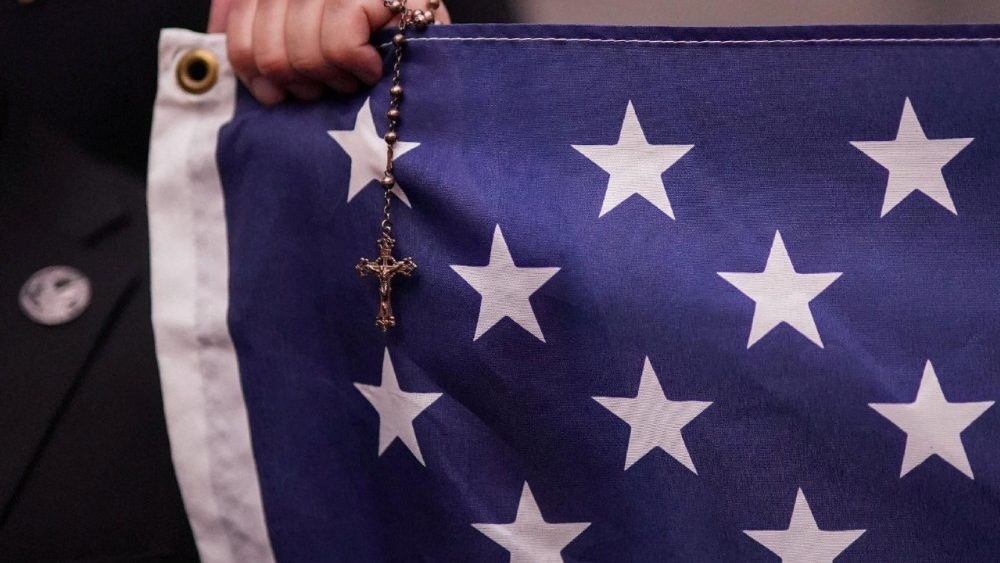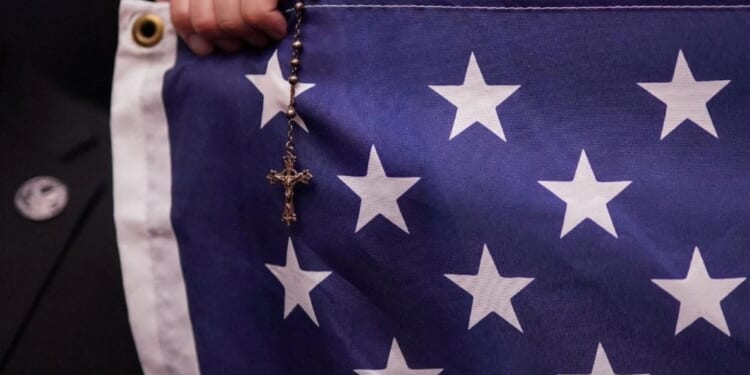It’s from a kind of compulsion that this week I write on Charlie Kirk. I keep seeing in my mind again and again the images. It is a brilliant day, the kind of day we live for in the summer. It’s glorious to be alive. He is smiling and relaxed, wearing a loose-fitting white tee shirt emblazoned with just one word, “Freedom.” Seated on a stool under a tent, he is good-naturedly taking questions from students gathered on a campus lawn. He has just answered a question with a question, lowered his mic to his lap, is smiling, waiting for the reply. So relaxed. So amiable. And then he is knocked off his stool with an obviously mortal wound to the neck from a high-powered rifle.
Why have I been obsessed with these images? I think because, allowing for differences, Charlie was doing what good professors hope to be doing. We like outdoor classes, holding forth, challenging students, winning their attention, debating to find truth together.
If so, I was shot with Charlie Kirk. And my children, and many of my students, have thought that they were shot also. They see that what they are up to was obliterated.
I do not agree with Peggy Noonan, who wrote that in a society with a sense of class the images would not even be shown: the Zapruder film of JFK’s assassination was censored for years, after all, to remove the bullet’s carnage. But as Cardinal Müeller has remarked, Charlie Kirk died as a witness, a martyr. I like to think I would have been present at the stadium, with other Christians, to watch St. Polycarp. It was good, not bad, to stand at the foot of the Cross and see the effects of torture. Sometimes it is good to be shocked.
What my children and students are up to was obliterated in more than one way. Charlie Kirk was hardworking. He was an entrepreneur. He got married young and worked even harder after that. He and his wife generously welcomed children. He studied hard and wanted to know what was true, not what people said. He read the Bible and prayed every morning and advised others to do the same. He loved his country. He believed that the United States is the greatest country that has ever existed, and that we are tremendously blessed to have been born and live here – which carries responsibilities. He did everything which he did out of love of Christ. This is what moved him. And he seemed on his way towards full communion with the Catholic Church.
Therefore, all of us with similar aspirations were shot with Charlie Kirk.

Why was he hated? Was it because he was “controversial”? But mere intellectual divergence does not itself generate hatred. I didn’t listen to his podcasts or follow him, but he said such things as that the trade-offs of allowing gun ownership in a society are preferable to the trade-offs of banning guns altogether. (Sounds right to me.) Also, that affirmative action was calculated to lead to discrimination, not remedy it. (Very plausible – and the intention is good.) That women should consider having children in their 20s and save a career for later. (Many women say the same.) I disagree with what I’ve since learned he held about immigration and housing. But, again, disagreement of itself will lead to discussion (“let’s talk”) or contempt (“you’re an idiot”) but not hatred.
Hatred to be sure can come from envy. Who is this tall, athletic and handsome guy, without a college degree, who married Miss Arizona and is so much more successful, so much wealthier and more influential, so much more widely followed and admired, than I? He was happy with an evident goodness. Many men in history have been hated for this reason alone. Read the Bible to see that Christians should expect it.
But I think he was mainly hated because he rejected our popular culture’s “settlement” about what love is. Love for us is to find a way to affirm whatever preference anyone has, and not to say anything which would imply that another person was mistaken, was going astray, or (most of all) was doing something which offends God. Doing so is to make others feel “unsafe” and possible to engage in “hate speech.”
But Charlie Kirk clearly held that if another is mistaken, going astray, or doing something which offends God–so that that other person would be displeased and might even hate you, if you were called to say something which would show him up–you must say it nonetheless, and certainly not deny it. Because it is true.
All of us must affirm to one another only what we are prepared to affirm as true in the presence of God.
Charlie Kirk referred to such a commitment as “courage.” He famously would say that courage is the easiest virtue, because all that it requires is to say “yes” – yes, I will affirm as true to others only what I am prepared to affirm as true in the presence of God.
If you go back to Solzhenitsyn’s famous address at Harvard’s commencement, you will see, if you do not remember it, that he diagnoses, as the chief failing of the West, a lack of ordinary courage: “A decline in courage may be the most striking feature that an outside observer notices in the West today. The Western world has lost its civic courage.”
Whatever his shortcomings, Charlie Kirk did not have that failing.
Solzhenitsyn went on to say, “There remain many courageous individuals, but they have no determining influence on public life.” Charlie Kirk’s life, at last, proved Solzhenitsyn wrong. And Charlie’s death is now being called a “hinge” point, a tipping point, indeed a turning point.
The signs of the times. We are supposed to look for them, as Catholics. It’s what we do: we see the good in something not our own, sort out the good from the bad, and then appropriate it. So then, how are we doing so with Charlie Kirk and his movement?











